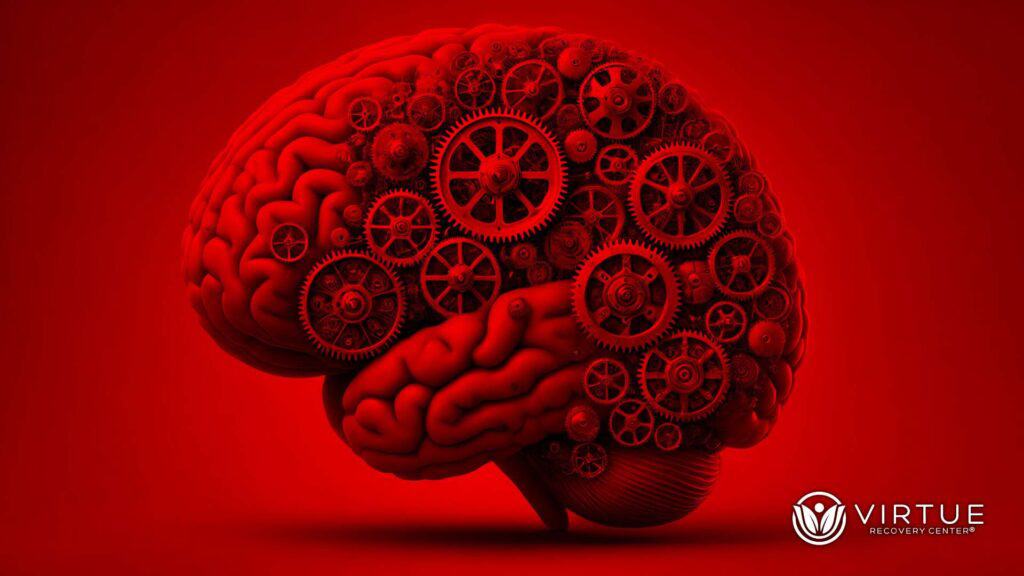Summary
Meth psychosis, also known as methamphetamine-induced psychosis, is a severe mental health condition triggered by methamphetamine use. Understanding its symptoms, causes, and treatment options is crucial for those affected and their loved ones. This article explores meth psychosis in detail and highlights the importance of seeking professional help.
Key Takeaways
- Understanding Meth Psychosis – Definition and overview.
- Causes and Risk Factors – Factors leading to meth psychosis.
- Symptoms of Meth Psychosis – Common psychotic symptoms.
- Effects on Mental Health – Impact on overall mental health.
- Treatment and Recovery – Treatment options and support.
Introduction
Meth psychosis is a significant concern for individuals using methamphetamine. This condition can lead to severe mental health issues, making it essential to recognize and address it promptly. At Virtue Recovery Las Vegas, we provide comprehensive support for those experiencing meth psychosis and other substance use disorders. This article delves into what meth psychosis is, its symptoms, and the available treatment options.
Understanding What Causes Meth Psychosis
Definition of Meth Psychosis
Meth psychosis refers to a state of psychosis induced by methamphetamine use. It involves severe psychotic symptoms such as hallucinations, paranoia, and delusions. Unlike other types of psychosis, such as schizophrenia, meth psychosis is directly triggered by the use of methamphetamine.
How Meth Psychosis Develops
Methamphetamine use affects the brain’s neurotransmitters, leading to altered perceptions and behaviors. When individuals use meth frequently or in large amounts, they are at higher risk of developing meth-induced psychosis. Chronic meth use can significantly increase the likelihood of experiencing persistent and severe psychotic episodes.
Causes and Risk Factors of Meth Addiction
Factors Leading to Methamphetamine Psychosis
The primary cause of meth psychosis is the use of methamphetamine, which impacts the brain’s chemistry. Factors such as the frequency of use, the amount of meth taken, and individual susceptibility play crucial roles in developing psychosis symptoms. Methamphetamine’s potency and the user’s overall mental health can also influence the onset of psychosis.
Chronic Meth Use and Substance-Induced Psychosis
Chronic meth users are particularly vulnerable to developing persistent psychosis. Long-term use of methamphetamine can lead to enduring changes in brain function, resulting in ongoing psychotic symptoms even after stopping the drug. This condition is known as chronic meth psychosis and requires comprehensive treatment.
Symptoms of Chronic Methamphetamine Psychosis
Common Psychotic Symptoms, Such as Hallucinations
Common symptoms of meth psychosis include hallucinations (visual and auditory), paranoid delusions, and tactile hallucinations (feeling things that aren’t there). Individuals may also exhibit extreme agitation, aggression, and confusion. These psychosis symptoms can be severe and frightening, both for the person experiencing them and for those around them.
Differentiating Meth Psychosis from Other Conditions, Such as Schizophrenia
It is essential to distinguish meth psychosis from conditions like schizophrenia. While both involve psychotic symptoms, meth psychosis is directly related to methamphetamine use. Symptoms of meth psychosis typically appear shortly after meth use and can persist for varying periods, depending on the severity and duration of use.
Effects on Mental Health
Impact on Overall Mental Health
The effects of methamphetamine on mental health are profound. Meth psychosis can exacerbate existing mental health problems or trigger new psychiatric conditions. The intense psychotic symptoms experienced during meth psychosis can lead to long-term mental health issues, including anxiety, depression, and cognitive impairments.
Persistent Psychosis on Individuals Who Use Meth
Persistent psychosis is a severe consequence of prolonged methamphetamine use. Even after discontinuing meth use, some individuals may continue to experience psychosis symptoms. This condition requires long-term treatment and support to manage effectively.
Addiction Treatment and Recovery
Treatment Programs for Meth Psychosis
Effective treatment for meth psychosis involves a combination of medical and therapeutic approaches. Treatment programs typically include detoxification, medication to manage psychiatric symptoms, and comprehensive therapy to address the underlying issues related to methamphetamine abuse.
Support and Resources
At Virtue Recovery Las Vegas, we offer specialized programs for individuals experiencing meth psychosis. Our treatment center provides a safe and supportive environment where individuals can receive the necessary care. Professional treatment is crucial for recovery, helping to manage meth addiction and reduce the risk of relapse.
Recovery Process
Recovery from methamphetamine-induced psychosis is a gradual process that requires commitment and support. Continuous care, including follow-up appointments and participation in support groups, is essential for maintaining mental health and preventing relapse. Addressing the root causes of methamphetamine use is key to achieving long-term recovery.
Conclusion
Understanding meth psychosis and recognizing its symptoms is vital for those affected and their loved ones. If you or someone you know is struggling with meth psychosis or meth addiction, seeking professional help is crucial. At Virtue Recovery Las Vegas, we are dedicated to providing comprehensive support and treatment to help individuals on their path to recovery. If you need assistance, contact us at 866-520-2861.
FAQs
What is meth psychosis?
Meth psychosis is a severe mental health condition caused by methamphetamine use, characterized by hallucinations, paranoia, and delusions.
What causes meth-induced psychosis?
Meth-induced psychosis is primarily caused by the use of methamphetamine, which disrupts brain chemistry and leads to psychotic symptoms.
What are the common symptoms of meth psychosis?
Common symptoms include hallucinations, paranoid delusions, extreme agitation, aggression, and confusion.
How does meth psychosis affect mental health?
Meth psychosis can lead to long-term mental health issues such as anxiety, depression, and cognitive impairments, even after stopping meth use.
When does amphetamine-induced psychosis become schizophrenia?
Amphetamine-induced psychosis typically resolves with the cessation of drug use. However, if psychotic symptoms persist for several months after stopping the drug, it may indicate the onset of a chronic psychotic disorder like schizophrenia, especially in individuals with a predisposition to mental health conditions.
Can drug psychosis be permanent?
While drug-induced psychosis often subsides after stopping drug use, in some cases, especially with prolonged or heavy use, psychotic symptoms can become long-lasting or permanent. This risk is higher in individuals with underlying mental health vulnerabilities.
What treatment for methamphetamine options are available for meth psychosis?
Treatment options include detoxification, medication to manage psychiatric symptoms and comprehensive therapy. Professional treatment centers like Virtue Recovery Las Vegas provide specialized programs for recovery.
What is the Connection Between Meth Psychosis and Two-Drug Treatment for Meth Addiction?
Meth psychosis is a serious mental health condition linked to long-term methamphetamine use. When it comes to twodrug treatment for meth addiction, combining medications such as naltrexone and bupropion has shown promising results in reducing meth use and cravings. This two-drug approach targets different aspects of addiction for more effective treatment.
Resources
https://www.ncbi.nlm.nih.gov/pmc/articles/PMC5027896/
https://www.sciencedirect.com/topics/medicine-and-dentistry/methamphetamine-induced-psychosis
https://psychiatryonline.org/doi/pdf/10.1176/appi.ajp.2009.08111695









